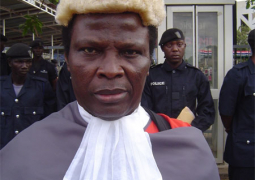The Gambia Women Finance Association (GAWFA) recently launched its company known as GAWFA Company Limited at its headquarters in Kanifing.
The company aims to empower women through micro-finance.
Speaking at the ceremony, the CEO of the company, Oley Njie Mbye, said GAWFA shares are providing an opportunity to change a woman’s life one day at a time, providing safety nets for the poor and empowering women at the socio-economic level with opportunity to make positive changes to a new generation.
“In addition you are contributing to make GAWFA sustainable both financially and institutionally to reach the mission and vision of the organisation,” she said.
Madam Mbye says GAWFA promotes self-sufficiency, empowerment and capacity building, which are integral not only to economic empowerment but also to human development in general.
“Having the resources for strategies alone is not enough but effective outcomes and sustainability are also fundamental for the advancement for women,” she noted.
Hannah Davis, the chairperson of GAWFA Board, in her statement, said GAWFA, established in 1987, “is the leading and largest micro-finance institution” in the country.
She says GAWFA has more than 48,948 members and over 13,682 active borrowers of whom 96.2% are women).
GAWFA has several branches across the rural areas of The Gambia. “GAWFA delivers a breadth of financial and non-financial services to its clients including capacity building through its partners and interrelated organizations,” Ms Davis said, adding that their mission is to serve as a financial intermediary to enhance the entrepreneurship development of women to alleviate poverty in The Gambia.
“The
For his part, Lamin Dibba, director of NGO Affairs, said that globally, there are about 8 to 10 million households served by micro-finance programmes.
“But notwithstanding we are faced with the major challenge of reducing the poverty of the world’s 6 billion people, out of which 2.8 billion live on less than 2 dollar a day and 1.2 billion live on less than a 1 dollar a day,” he said.
Majority of these people are women, he said, adding that most microfinance institutions including GAWFA target women for various reasons, because apart from being underserved women are willing to pay back loans.
GAWFA could uplift the economic and social status of its members, Mr Dibba said, adding that some of its members had succeeded, but “many are still borrowing and are still not independent”.
“GAWFA therefore needs to demonstrate first that poor households can benefit from greater access to loans, and secondly they have to prove that the institution does not necessarily suffer heavy losses from lending to the poor,” he said. “As a government institution charged with the coordination and monitoring of NGO activities in the country, they would ensure that this innovation becomes a model in
For his part, the principal officer of the Central Bank of The Gambia, Siaka Bah, said: “The Central Bank of The Gambia, as the regulator of MFIs, are glad to see that GAWFA is transforming from an NGO to a commercially viable micro-finance institutions (MFIs), we hope GAWFA will work concertedly to maintain prudential requirements.”


